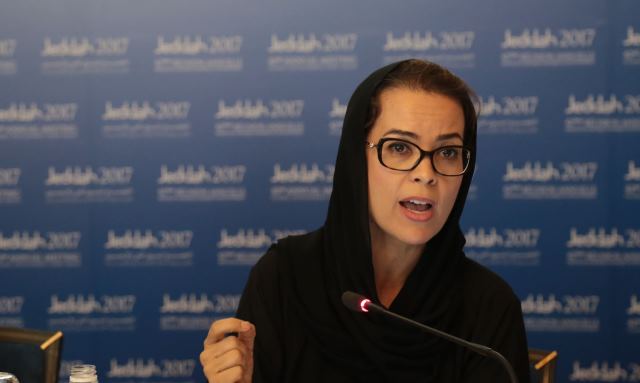
Jeddah, Saudi Arabia, 16 May 2017 ― Leading international policymakers, experts and scientists have called for urgent action to engage more youth in agricultural production to tackle unemployment and food insecurity.
More than 100 delegates from different countries gathered at a special high-level seminar on the sidelines of the Islamic Development Bank (IsDB) 42nd Annual Meeting in Jeddah, Saudi Arabia, to discuss approaches to making agricultural production more attractive to the younger generation.
Organized by the IsDB and the International Center for Biosaline Agriculture (ICBA) under the title “Youth engagement in agriculture production: Developing technologies that appeal to youth to make farming an attractive career option”, the seminar looked at the challenges and problems facing rural young people and what should be done to overcome them.
Unemployment is the highest among young people but unlike past generations, the current generation has access to technologies that show them a world of possible alternatives. The hard work of primary agricultural production and low incomes are not attractive to many of the youth even in poor areas. Today the average age of farmers is between 40 and 50 years in many places, and it is steadily increasing. The future food security is highly dependent on the success of engaging youth in agricultural production.
Participants agreed that the focus should be on resource-efficient technologies that work for young people and make agriculture a viable source of income. These technologies can include solar pumps, improved irrigation systems that use sensors to control water flows based on plant needs, or can automatically adjust fertilizer and pesticide application rates based on growing conditions. For example, greenhouse and net-house technologies, as well as other technologies for protected agriculture, make high-value agricultural production possible even in the most marginal lands and provide higher incomes from primary production.
Mr. Amadou Thierno Diallo, Director, Agriculture and Rural Development Department, IsDB, said: “If we can successfully achieve youth engagement in the agricultural sector, we will be addressing food security as well as the growing youth unemployment in member countries.”
Prof. Abdulrahman Sultan Alsharhan, Chairman of the Board of Directors, ICBA, said: “It is high time to find ways to engage more youth in agricultural production, which is not possible without the support of leaders. Together we need to find solutions to engage and attract more youth towards agriculture, and one of the key solutions is to promote farming as a sustainable means of income, providing youth with financial support, spreading awareness about agripreneurship, and equipping them with best farming technologies.”
Dr. Ismahane Elouafi, Director General of ICBA, said: “The future of all nations depends on their youth. In many parts of the world, especially in Africa, agriculture and youth have had a very strong connection over centuries. Looking forward, those ties should be reinforced to build a more secure and prosperous tomorrow. Agriculture can absorb the youth enthusiasm and provide them with opportunities to grow and blossom; but it has to be an appealing future for the ambitious and savvy youth of today. It is alarming to see the current trend when youth are shying away from the agricultural sector. Not only does it threaten the future food security, but also the social, economic and political stability of future generations. I’m sure high-level discussions and seminars like this one will identify successful ways to engage more youth in agriculture.”
Mr. Gilbert F. Houngbo, President of the United Nations specialized agency International Fund for Agricultural Development (IFAD), said: “The Islamic Development Bank has been an important partner for IFAD since the Fund’s earliest days, and IFAD and ICBA have a long-standing partnership to help smallholders improve their productivity and resilience. We share a deep and abiding commitment to ending rural poverty and hunger. The importance of creating attractive careers for young people in agriculture cannot be over-stated. We need young people to go into food production because the current generation of farmers is getting older at a time when we need to feed more people than ever. But we also need young people to go into agriculture because successful farms and agri-businesses can stimulate rural economies.”
The seminar focused on the role of young farmers in boosting agricultural productivity to achieve food security in IsDB member countries; exploring the agricultural production technologies that have high impact on improving the livelihood of farmers, especially in marginal environments; and raising awareness about the efforts of IsDB and ICBA to support farmers with enhanced technologies and build their capacities.
The seminar was attended by policymakers from IsDB member countries; professionals from research institutions; educational institutions; regional and international research organizations; non-governmental organizations; and other organizations working for youth in agriculture.
The Board of Governors of the IsDB Group holds annual meetings to discuss development issues and institutional matters. The meeting provides an ideal platform for decision-makers to discuss challenges and explore opportunities in the IsDB Group member countries.
###
Press enquiries:
Mr. Showkat Nabi Rather: s.rather@biosaline.org.ae, or +971 55 137 8653
About ICBA
The International Center for Biosaline Agriculture (ICBA) is an international, non-profit, research-for-development organization that aims to strengthen agricultural productivity in marginal and saline environments through identifying, testing and facilitating access to sustainable solutions for food, nutrition and income security.
About IsDB
The Islamic Development Bank is a multilateral development institution, established in July 1975 with the headquarters in Jeddah, Saudi Arabia. The IsDB provides Shari’ah-compatible funding and technical assistance to its 57 member countries and in line with its overall objective of fostering economic development and social progress, it finances projects and programs in both public and private sectors in member countries by investing in economic and social infrastructure, and promoting foreign trade. The IsDB also assists Muslim communities in non-member countries and undertakes research studies in Islamic economics and banking.
For more information, visit www.isdb.org.
This press release was originally disseminated by ICBA, a Partner in GFAR.
